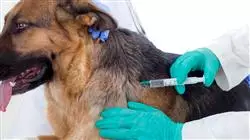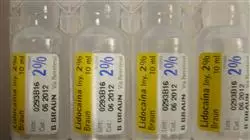University certificate
The world's largest faculty of pharmacy”
Introduction to the Program
Succeed with the best and acquire the knowledge and skills you need to embark on the Veterinary Pharmacology industry"

The Professional master’s degree covers all the latest developments in the field of pharmacology applicable in clinical practice. Veterinary Pharmacology should promote research into new drugs, new indications for drugs already on the market and new therapeutic strategies. On the other hand, the correct use of the drugs available at any given time for established indications should be considered. It is important to interpret the kinetics of drugs from the time they enter the body until they are eliminated. As well as the analysis of the correlation between the effects of drugs and the concentration of their free fraction in blood, and the consideration of drug interactions and their undesirable or collateral effects.
This Professional master’s degree is a great tool available for the professional pharmacist that allows him/her to specialize in the area of pharmacology of the veterinary clinic, since there are more and more pets and exotic animals that require specific medication for certain pathologies. A high-quality training, offering the most advanced resources in online specialization, to guarantee the student an effective, real and practical learning that will boost their competencies to the highest level in this area of work.
The content of each module provides the student with comprehensive training in the theoretical and practical aspects of Veterinary Pharmacology . The internships that are proposed make the Professional master’s degree unique by applying different simulated situations that will allow students to develop skills for their performance in the real clinical environment.
The program includes practical activities to facilitate students' acquisition and mastery of the theory learned, supporting and complementing the knowledge acquired in the theoretical teaching. The contents are presented to the professional in an attractive and dynamic way in multimedia packages that include videos, images and diagrams in order to reinforce knowledge.
Thanks to its innovative teaching methodology, it allows the student to follow its contents in a totally flexible and personalized way, with great availability on the part of the teachers for consultations, doubts or tutorials.
After passing the evaluations of the Professional master’s degree in Veterinary Pharmacology, the professional will have acquired the necessary professional competences to carry out a quality and up-to-date praxis.
A comprehensive training in the use of veterinary drugs for the prevention and treatment of diseases affecting animal health"
This Professional master’s degree in Veterinary Pharmacology contains the most complete and up-to-date scientific program on the market. The most important features of the program include:
- Practical cases presented by experts in Veterinary Pharmacology
- The graphic, schematic, and eminently practical contents with which they are created, provide scientific and practical information on the disciplines that are essential for professional practice
- Practical exercises where self-assessment can be used to improve learning
- Its special emphasis on innovative methodologies
- Theoretical lessons, questions to the expert, debate forums on controversial topics, and individual reflection assignments
- Content that is accessible from any fixed or portable device with an Internet connection
Learn in an efficient way, with a real qualification objective, with this Professional master’s degree, unique for its quality and price, in the online teaching market"
The program’s teaching staff includes professionals from sector who contribute their work experience to this training program, as well as renowned specialists from leading societies and prestigious universities.
Its multimedia content, developed with the latest scientific technology, will allow the professional a situated and contextual learning, that is, a simulated environment that will provide an immersive program programmed to learn in real situations.
This program is designed around Problem-Based Learning, whereby the professional must try to solve the different professional practice situations that arise throughout the program. For this purpose, the student will be assisted by an innovative interactive video system created by renowned and experienced experts.
The competencies you will acquire after completing this Professional master’s degree will position you as an expert in Veterinary Pharmacology"

Improving your skills in a sector with a high demand for professionals will boost both your professional and personal career"
Why study at TECH?
TECH is the world’s largest online university. With an impressive catalog of more than 14,000 university programs available in 11 languages, it is positioned as a leader in employability, with a 99% job placement rate. In addition, it relies on an enormous faculty of more than 6,000 professors of the highest international renown.

Study at the world's largest online university and guarantee your professional success. The future starts at TECH”
The world’s best online university according to FORBES
The prestigious Forbes magazine, specialized in business and finance, has highlighted TECH as “the world's best online university” This is what they have recently stated in an article in their digital edition in which they echo the success story of this institution, “thanks to the academic offer it provides, the selection of its teaching staff, and an innovative learning method aimed at educating the professionals of the future”
A revolutionary study method, a cutting-edge faculty and a practical focus: the key to TECH's success.
The most complete study plans on the university scene
TECH offers the most complete study plans on the university scene, with syllabuses that cover fundamental concepts and, at the same time, the main scientific advances in their specific scientific areas. In addition, these programs are continuously being updated to guarantee students the academic vanguard and the most in-demand professional skills. In this way, the university's qualifications provide its graduates with a significant advantage to propel their careers to success.
TECH offers the most comprehensive and intensive study plans on the current university scene.
A world-class teaching staff
TECH's teaching staff is made up of more than 6,000 professors with the highest international recognition. Professors, researchers and top executives of multinational companies, including Isaiah Covington, performance coach of the Boston Celtics; Magda Romanska, principal investigator at Harvard MetaLAB; Ignacio Wistumba, chairman of the department of translational molecular pathology at MD Anderson Cancer Center; and D.W. Pine, creative director of TIME magazine, among others.
Internationally renowned experts, specialized in different branches of Health, Technology, Communication and Business, form part of the TECH faculty.
A unique learning method
TECH is the first university to use Relearning in all its programs. It is the best online learning methodology, accredited with international teaching quality certifications, provided by prestigious educational agencies. In addition, this disruptive educational model is complemented with the “Case Method”, thereby setting up a unique online teaching strategy. Innovative teaching resources are also implemented, including detailed videos, infographics and interactive summaries.
TECH combines Relearning and the Case Method in all its university programs to guarantee excellent theoretical and practical learning, studying whenever and wherever you want.
The world's largest online university
TECH is the world’s largest online university. We are the largest educational institution, with the best and widest online educational catalog, one hundred percent online and covering the vast majority of areas of knowledge. We offer a large selection of our own degrees and accredited online undergraduate and postgraduate degrees. In total, more than 14,000 university degrees, in eleven different languages, make us the largest educational largest in the world.
TECH has the world's most extensive catalog of academic and official programs, available in more than 11 languages.
Google Premier Partner
The American technology giant has awarded TECH the Google Google Premier Partner badge. This award, which is only available to 3% of the world's companies, highlights the efficient, flexible and tailored experience that this university provides to students. The recognition as a Google Premier Partner not only accredits the maximum rigor, performance and investment in TECH's digital infrastructures, but also places this university as one of the world's leading technology companies.
Google has positioned TECH in the top 3% of the world's most important technology companies by awarding it its Google Premier Partner badge.
The official online university of the NBA
TECH is the official online university of the NBA. Thanks to our agreement with the biggest league in basketball, we offer our students exclusive university programs, as well as a wide variety of educational resources focused on the business of the league and other areas of the sports industry. Each program is made up of a uniquely designed syllabus and features exceptional guest hosts: professionals with a distinguished sports background who will offer their expertise on the most relevant topics.
TECH has been selected by the NBA, the world's top basketball league, as its official online university.
The top-rated university by its students
Students have positioned TECH as the world's top-rated university on the main review websites, with a highest rating of 4.9 out of 5, obtained from more than 1,000 reviews. These results consolidate TECH as the benchmark university institution at an international level, reflecting the excellence and positive impact of its educational model.” reflecting the excellence and positive impact of its educational model.”
TECH is the world’s top-rated university by its students.
Leaders in employability
TECH has managed to become the leading university in employability. 99% of its students obtain jobs in the academic field they have studied, within one year of completing any of the university's programs. A similar number achieve immediate career enhancement. All this thanks to a study methodology that bases its effectiveness on the acquisition of practical skills, which are absolutely necessary for professional development.
99% of TECH graduates find a job within a year of completing their studies.
Professional Master's Degree in Veterinary Pharmacology
If you are a professional in the veterinary field and are looking to expand your knowledge in the field of pharmacology, TECH Global University has the perfect program for you: our Professional Master's Degree in Veterinary Pharmacology, taught in an online modality. Online classes offer you the convenience of studying from anywhere and adapting your learning schedule to your professional and personal commitments. At TECH Global University, we have developed an advanced online platform that allows you to access the Professional Master's Degree content in an interactive and participatory way. Our Professional Master's Degree, taught by our Faculty of Pharmacy, is designed to provide you with the skills and knowledge necessary to safely and efficiently apply drugs in the treatment and care of animals. You will learn about the different types of drugs used in veterinary medicine, their mechanisms of action, proper dosage and possible side effects.
Study the best postgraduate course in veterinary pharmacology
We understand the importance of veterinary pharmacology in the health and welfare of animals. That's why our program focuses on providing you with solid, up-to-date training, with an emphasis on the most recent advances in the field of veterinary medicine. In addition to the flexibility of online classes, our Professional Master's Degree offers additional benefits. You will have the opportunity to interact with experts in veterinary pharmacology through live sessions and discussion forums. You will also have complementary study material, such as clinical cases and teaching resources, which will allow you to apply your knowledge in practical situations. At TECH Global University, we are committed to your academic and professional success. That is why our teaching team is made up of professionals with extensive experience in the field of veterinary pharmacology, who will provide you with support and guidance throughout the program. Don't miss the opportunity to boost your career in the field of veterinary pharmacology. Enroll in our Professional Master's Degree in Veterinary Pharmacology at TECH Global University and acquire the skills and knowledge necessary to make a difference in animal health.







